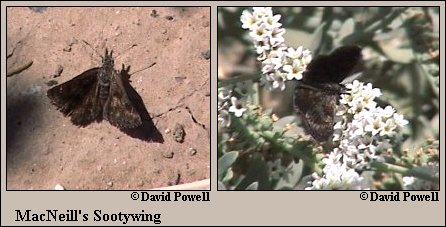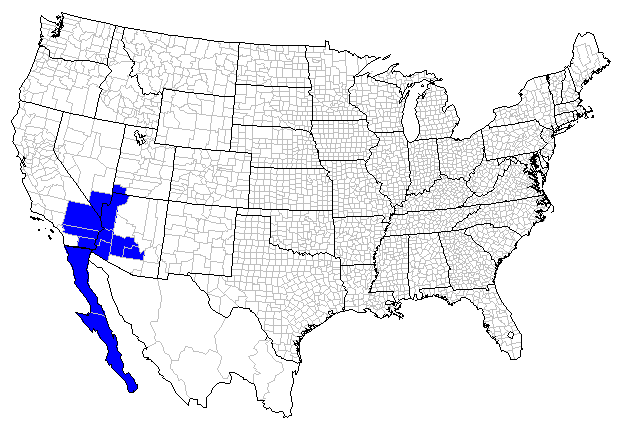 |
 

 |



McNeil's Saltbush Sootywing (Hesperopsis gracielae)
Wing span: 3/4 - 1 1/4 inches (2 - 3.2 cm).
Identification: Fringes are checkered. Upperside is black. Forewing has a mottled gray pattern and a row of short dark bars near the outer margin. Hindwing may have pale spots. Underside is black; hindwing has a few small pale spots.
Life history: To find receptive females, males patrol all day around the host plants and in gulches. Females lay eggs on the host plant. Caterpillars eat leaves and make shelters of rolled leaves.
Flight: Many broods from April-October.
Caterpillar hosts: Various plants in the goosefoot family (Chenopodiaceae) including shadscale (Atriplex canescens), quail brush (Atriplex lentiformis), and silverscale saltbush (A. argentea var. expansa).
Adult food: Flower nectar.
Habitat: Desert washes, alkali flats, arid canyons.
Range: Along the Colorado River from southern Utah to southern Nevada and southern Arizona; in the Coachella Valley, California.
Conservation: Not usually required.
The Nature Conservancy Global Rank: G4 - Apparently secure globally, though it might be quite rare in parts of its range, especially at the periphery.
Management needs: None reported.
References:
Opler, P. A. and V. Malikul. 1992. A field guide to eastern butterflies. Peterson
field guide #4. Houghton-Mifflin Co., Boston. 396 pages, 48 color plates.
Scott, J. A. 1986. The butterflies of North America. Stanford University Press,
Stanford, Calif. 583 pages, 64 color plates.
Stanford, R. E. and P. A. Opler. 1993. Atlas of western USA butterflies including
adjacent parts of Canada and Mexico. Denver and Fort Collins, CO.
Tilden, J. W. 1986. A field guide to western butterflies. Houghton-Mifflin Co.,
Boston, Mass. 370 pages, 23 color plates.
Author: Jane M. Struttmann

